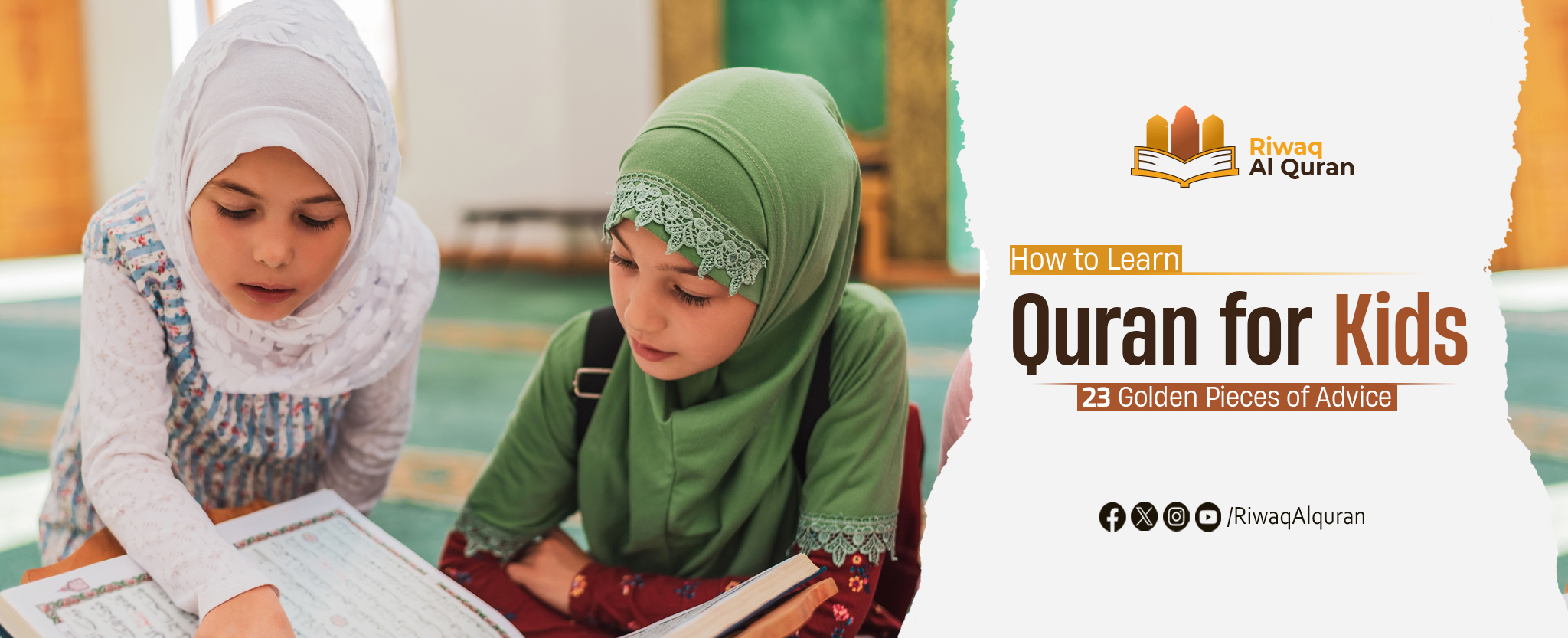Every Muslim parent dreams of their children starting to pray and learn Quran for kids from a young age because they believe that today’s kids will shape the future of our community. However, teaching the Quran to young children can be challenging.
To make it more accessible and enjoyable, parents use colorful books, videos, and fun apps designed for kids. They might also include games, songs, and stories to make learning about Islam exciting. Some parents even enroll their children in special Quranic classes where teachers use methods that kids can easily understand.
By being patient, supportive, and consistent, parents create a positive environment for their kids to learn and grow spiritually within the Muslim community. In this blog, you will find 23 fruitful tips for making the learning process easier.
Table of Contents
How to Learn the Quran for Kids?
Teaching kids Surahs and Duas through oral repetition might seem straightforward, but when it comes to teaching them to read the Quran, it requires extra patience and consistency.
Teaching children the Quran is not merely about imparting knowledge; it is about nurturing a lifelong connection with the Book of Allah. As a Quran expert, I emphasize that this process requires a blend of pedagogical expertise, spiritual sensitivity, and a deep understanding of child psychology.
If you’re concerned about how to go about helping your kids learn to read the Holy Quran, Below, I present a refined, expert-level approach to teaching the Quran to children, enriched with tips and recommendations rooted in Quranic principles and educational best practices.
1. Lay the Foundation with Tawhid and Love for the Quran
Before diving into recitation or memorization, instill in children the understanding that the Quran is the word of Allah (SWT) and a divine guide for life. Share stories of the Prophet Muhammad (PBUH) and his companions to inspire love and reverence for the Quran. Begin with Surah Al-Fatiha and short Surahs like Al-Ikhlas, Al-Falaq, and An-Nas, explaining their meanings and significance.
Tip: Use age-appropriate language to explain the Quran’s miraculous nature (I’jaz al-Quran) and its role as a source of guidance, mercy, and healing.
2. Engage Through Quranic Storytelling and Interactive Resources:
Children are naturally drawn to stories. Utilize Quranic narratives like the story of Prophet Yusuf (AS), Prophet Musa (AS), and the people of the cave (Ashab al-Kahf) to teach moral lessons and spark curiosity. Supplement these stories with vibrant illustrations, animated videos, and interactive apps designed for Quranic education.
Introducing the Quran to kids doesn’t have to be a dull or intimidating experience. Utilize vibrant storybooks, animated videos, and interactive apps specifically created for children.
By incorporating games and activities that align with Quranic teachings, you can make the learning process enjoyable and create a positive and playful atmosphere, sparking their interest in exploring the Quran.
Share simplified and age-appropriate stories from the Quran that convey important lessons and values. Narratives help children relate to the teachings in a storytelling format, making the content more engaging and memorable.
Recommendation: Choose resources that are authentic and aligned with Quranic teachings, avoiding any distortions or misrepresentations of Islamic values.
3. Establish a Consistent Routine:
Consistency is key when teaching anything, especially the Quran. Set a daily schedule for Quranic study, even if it’s just 15-20 minutes. Designate a quiet, clean space for learning, free from distractions, to create an environment of focus and respect for the Quran.
Creating a dedicated space for learning provides a sense of structure and reinforces the significance of Quranic studies in their lives.
Tip: Begin each session with Bismillah and a short dua for seeking knowledge, such as “Rabbi zidni ilma” (My Lord, increase me in knowledge).
4. Visual Aids and Mnemonics for Memorization
Children are visual learners. Use colorful charts, flashcards, and posters to teach Arabic letters, Tajweed rules, and Quranic vocabulary. Introduce mnemonics and rhymes to help them memorize verses (ayahs) and short Surahs effectively.
Mnemonics, such as simple rhymes or memory aids, can make the learning process more accessible and enjoyable. Incorporating illustrations and diagrams helps in explaining the meanings of verses or concepts, making the content more relatable and understandable for young minds.
Recommendation: For Tajweed, use visual representations of articulation points (makharij) and practice correct pronunciation through repetition.
5. Encourage Active Participation:
Engage children by asking open-ended questions about the Quranic verses they are learning. For example, “What do you think Allah is teaching us in this verse?” or “How can we apply this lesson in our daily lives?” Encourage them to recite aloud and correct their mistakes gently.
Tip: Use positive reinforcement, such as praising their effort and progress, to build confidence and motivation.
6. Incorporate Multisensory Learning Techniques
Engage multiple senses during the learning process. Besides visual aids, include auditory elements like listening to recitations or songs related to Quranic verses. Hands-on activities, such as tracing Arabic letters in sand or using tactile materials, can enhance the learning experience by involving touch and movement.
Engage multiple senses to enhance retention and understanding. For example:
- Auditory: Play recitations by renowned Qaris like Sheikh Al-Hussary or Sheikh Sudais.
- Tactile: Use sand trays or textured materials to practice writing Arabic letters.
- Kinesthetic: Incorporate hand gestures or body movements to represent the meanings of certain words or verses.
Recommendation: Pair recitation with translation to help children connect the sounds of the Quran with its meanings.
7. Relate Quranic Teachings to Everyday Life
Relate Quranic teachings to daily life experiences. Connect the lessons to familiar situations, stories, or moral values that children encounter regularly.
Help children see the Quran as a practical guide by connecting its teachings to their daily experiences. For instance, when teaching Surah Al-Asr, discuss the importance of time management and good deeds. When teaching Surah Al-Ma’un, emphasize the value of kindness and helping others.
Tip: Use real-life scenarios to illustrate how Quranic principles can be applied, fostering a deeper understanding and appreciation.
8. Celebrate Milestones and Achievements:
Recognize and celebrate small milestones in your child’s Quranic learning journey. Whether it’s successfully memorizing a verse, improving pronunciation, or showing enthusiasm during a session, acknowledge their efforts.
Encourage them to reflect on their journey and express gratitude to Allah for enabling them to learn His Book.
Recommendation: Organize small family gatherings where children can showcase their Quranic knowledge, reinforcing their sense of achievement.
9. Foster Curiosity and Encourage Questions:
Create a safe space for children to ask questions about the Quran. Answer their queries with patience and clarity, using simple explanations and examples. If you don’t know the answer, research together to model the importance of seeking knowledge.
Encourage their natural curiosity by addressing their inquiries with patience and clarity. This not only helps in deepening their understanding but also promotes a healthy and active engagement with the Quranic teachings.
Tip: Use questions as an opportunity to deepen their understanding and strengthen their connection with the Quran.
10. Integrate Dua and Spiritual Practices
Teach children the importance of dua in their Quranic journey. Encourage them to recite duas for memorization, such as “Allahumma nawwir qalbi bil-Quran” (O Allah, illuminate my heart with the Quran). Incorporate moments of reflection (tadabbur) to help them internalize the Quran’s messages.
Recommendation: Pair Quranic learning with acts of worship, such as Salah, to reinforce the Quran’s role as a guide for all aspects of life.
11. Organize Regular Assessments and Revisions
Revising everyday lessons allows the kids to remember them for a long time. Besides daily revisions, you can also arrange weekly tests to check the progress and fluency of the child and put in more effort accordingly.
Conduct weekly or monthly tests to evaluate your child’s progress in recitation, memorization, and understanding. Use these assessments to identify areas for improvement and tailor your teaching approach accordingly.
Tip: Focus on quality over speed. Ensure that your child pronounces each word correctly and understands its meaning before moving forward.
12. Don’t Fear Failure – Patience and Trust in Allah’s Plan
Every child learns at their own pace. Avoid comparing your child’s progress to others and instead focus on their individual growth. Be patient and persistent, trusting that Allah will bless your efforts.
Recommendation: Remind yourself and your child of the hadith: “The best among you are those who learn the Quran and teach it.” (Sahih Bukhari). This will keep you motivated and focused on the ultimate goal—pleasing Allah.
13. Live A Lifelong Journey with the Quran
Teaching the Quran to children is a sacred responsibility and a means of earning immense reward. By combining effective teaching methods with spiritual depth, you can nurture a generation that not only reads the Quran but lives by its teachings. Remember, the goal is not just to produce Hafiz or Qaris but to raise children who embody the Quran’s values and carry its light throughout their lives.
Dua for Success: “Rabbi hab li min ladunka zurriyyatan tayyibatan innaka samee’ud-dua” (My Lord, grant me from Yourself a good offspring. Indeed, You are the Hearer of supplication). (Quran 3:38)
How To Learn the Quran For Kids At Home?
Teaching the Quran to kids at home involves creating a supportive environment, adapting to individual learning styles, and utilizing technology and community connections. Designating a learning space, celebrating Islamic occasions, and seeking online help are essential, alongside making dua for guidance from Allah.
1. Create a Supportive Learning Environment:
Foster a nurturing atmosphere that encourages curiosity and exploration. Be patient and understanding during the learning process, providing gentle guidance and support. A positive and supportive environment helps children feel comfortable, making them more receptive to Quranic education.
2. Involve the Extended Family:
Create a sense of community around Quranic education by involving extended family members. Perhaps organize joint learning sessions or events where children can share their progress with grandparents, aunts, uncles, and cousins. This collective involvement reinforces the importance of Quranic education within the broader family structure.
3. Adapt to Individual Learning Styles:
Recognize and adapt to the unique learning styles of each child. Some may thrive through visual aids, while others may benefit more from verbal explanations. Observing and understanding how your child learns best allows you to tailor your teaching approach, making the Quranic education experience more personalized and effective.
As a parent, you must understand that each child is different, and you cannot teach all of them the same way. Learn about your child’s learning patterns and teach accordingly.
For example, if your kid does not like sitting at one time for a long time, you can break every day’s lessons into shorter ones. Or, if they find revising orally more convenient after the lessons, do that while you play with them. It is all about knowing your child’s personality and learning pattern to find what makes learning easy for them.
4. Connect with a Quranic Community:
Join or establish a community group with other families focused on Quranic learning for children. This creates a supportive network where kids can learn together, share experiences, and build friendships based on a common goal of understanding the Quran.
5. Utilize Technology Wisely:
Leverage educational technology to supplement Quranic learning. Choose apps, websites, or online platforms that offer interactive and age-appropriate content. However, ensure screen time is balanced and monitor the content to align with your values and educational goals.
Riwaq Al Quran stands as a specialized online platform dedicated to teaching children the Quran interactively and engagingly. This unique platform goes beyond conventional methods, offering a dynamic learning experience tailored to the needs of young minds.
By incorporating vibrant visuals, interactive games, and a structured curriculum, Riwaq Al Quran aims to make the process of learning the Quran enjoyable and effective for kids. It creates a supportive virtual community, connecting children with experienced instructors and fellow learners, fostering a positive and collaborative environment for Quranic education.
6. Promote Group Activities:
Organize group activities where children can learn together, fostering a sense of camaraderie and shared responsibility. This could include group recitations, creative projects, or collaborative learning games that make Quranic education a social and enjoyable experience.
7. Create a Quranic Learning Space:
Designate a specific area in your home for Quranic learning. Decorate it with colorful and inspirational elements related to Islam. This dedicated space serves as a constant reminder of the importance of Quranic education and provides a focused environment for learning sessions.
8. Celebrate Islamic Occasions:
Connect Quranic education with Islamic occasions and celebrations. Incorporate teachings related to specific events, such as Ramadan or Hajj, into the learning curriculum. This not only deepens their understanding but also enhances the cultural and festive aspects of Quranic education.
9. Ask for Online Help:
You might ask: how do I teach my child the Quran? And the answer simply is: take help anytime you need it! Teaching the Quran to children can be tiresome and hectic at the same time as children do not understand as simply as adults. If you get stuck anywhere or cannot find the right answers to the kid’s questions, do not hesitate to connect to a Hafiz to find the right answers.
Riwaq al Quran stands out as a specialized online platform uniquely designed to teach children the Quran. Through a blend of interactive tools and a structured curriculum, the platform strives to make Quranic education enjoyable and accessible for young learners.
With a focus on creating a supportive online community, Riwaq al Quran not only imparts essential knowledge but also fosters a positive and engaging environment for children to embark on their Quranic learning journey.
Here are a sample of our set of Quran Courses that will be helpful for you:
- Online Tafseer Course: Delve into Quranic meanings with our insightful online Tafseer course.
- Noorani Qaida Online: Learn Quranic basics efficiently through our Noorani Qaida online program.
- Online Quran Recitation Course: Enhance Quranic recitation skills through our expert-led online course.
- Online Tajweed Classes: Master Tajweed rules for beautiful Quranic recitation in online classes.
- Quran Memorization Online Course: Memorize the Quran effectively with our specialized online memorization course.
- Online Qirat Course: Explore diverse Qirat styles with our comprehensive online Qirat course.
- Online Quran Classes for Kids: Nurture a love for the Quran in kids through interactive online classes.
10. Make Dua
Apart from putting effort mentally, asking for help from Allah is also vital. Especially if your child is having a hard time, stay patient and ask Allah for help. Also, make dua to Allah to keep your child on the track of virtue and make them righteous Muslims.
Abu Saeed Al-Khudri reported: The Prophet, peace and blessings be upon him, said, “There is no Muslim who calls upon Allah, without sin or cutting family ties, but that Allah will give him one of three answers:
He will quickly fulfill his supplication, He will store it for him in the Hereafter, or He will divert an evil from him similar to it.” They said, “In that case, we will ask for more.” The Prophet said, “Allah has even more.” (Al-Albani)
For other tactics on how to make Quran for Kids enjoyable, check this blog out!
The Importance of Online Quran Teaching for Kids:
Prophet Mohammed (may Allah’s Peace and Blessings be upon him) has asserted for many times the importance of learning and teaching Quran in a number of Hadiths. For instance, ‘Uthman bin ‘Affan (May Allah be pleased with him) reported: The Messenger of Allah (blessings and peace of Allah be upon him) said, “The best amongst you is the one who learns the Quran and teaches it. (Al-Bukhari)
It is also necessary to know that it is not only a matter of recitation but what really matters is beholding its morals and following its teachings. A true Muslim is the one who applies everything he/she learns from the Quran as it contains many didactic lessons for all of us to learn and apply. When this happens, you get to have the whole possible benefits on both personal and societal levels.
Benefits of Online Quran Learning for kids:
Nowadays, online Quran learning has become greatly widespread as many people resorted to it due to its enormous benefits. When it comes to the Holy Quran, we should realize the importance of online Quran learning for kids and the benefits it brings for them and for their parents.
In the past, kids had to physically join a Kuttab (a traditional institute for teaching the Quran) or even go to the Masjid to be able to learn Quran. This traditional way may be tiring for some parents and kids. But when the new method of teaching Quran online for kids emerged, it brought many benefits and facilitated the Quran learning process so much. Here are some of its benefits:
Flexibility of Setting a Suitable Fixed Time:
In the old traditional way of teaching Quran for kids, it was difficult to set a fixed time for the class that suits parents with busy schedules. On the other hand, online Quran teaching is flexible enough to set the day and the time that works best for you and your children to learn Holy Quran online. This flexibility of time bridges the gaps between the countries of the entire world with different time zones.

Full Attention and Concentration During the Live Quran Classes:
It is known that using different tactics to make Quran for kids enjoyable plays a vital role throughout the learning process. In the traditional way of learning the Quran, children join groups and in some places, these groups are so crowded that every child does not receive enough attention or care.
On the other hand, online Quran learning provides the child with a great opportunity to have full attention without any disturbance or distraction. This facilitates the processes of teaching and learning so much and creates a great chance for teachers to correct the mistakes of their students while reciting.
Having Excellent and Skilful Quran Tutors:
In some areas of the world, it is not easy to find a Quran teacher that is qualified and experienced, and parents spend much time searching for a qualified one. Thankfully, you can now find many teachers who are qualified in that field so they can help in Tajweed and make you children learn to read Quran online for kids the proper way.
Monitoring and Maintaining the Security of the Children:
One of the best advantages of online Quran learning is that it makes it way easier for parents to monitor the class and evaluate their kids’ progress. In addition, they can follow up with the teachers to make sure that their kids are improving and get benefit from their classes.

Interactive Quran learning with participation, practice, and feedback:
The traditional way of teaching does not ensure the availability to interact well in the class due to several aspects such as the huge number of the group and the different types of distractions. But, online Quran learning for kids ensures various methods of interaction in the session.
What Age Do I Teach My Child Quran?
While there is no fixed age for teaching the Holy Quran to your kids, you can start anywhere between 3 to 6 years of age. Some people think that the Quran should be taught as soon as kids start reading. On the other hand, some believe that the right age is between 6 and 7 when they can better understand the Quran and its teachings.
So, it differs from one kid to another, some people even start that rewarding journey earlier than that by reciting the Quran in front of their children and playing Quranic tracks as much time as they can to make them familiar with it and instill the love of the book of Allah in their little hearts.
Here is a detailed and informative blog about the best age to start teaching kids Quran!
Final Words
To sum up, the process of teaching the Quran to your kids starts as soon as you think about it. Attract your kids towards the religion and create a love for the Holy Quran in their hearts. Be patient and bond with your kids to make sure they don’t take it as a chore and enjoy being close to the Quran. Take it slow, make dua, and appreciate your kids to motivate them to do better.
Riwaq Al Quran is a dedicated online platform focused on providing specialized Quranic education for children. By offering a dynamic and interactive learning experience, we aim to make the process enjoyable and effective, fostering a positive connection between kids and the teachings of the Quran. Enroll in our special classes to learn Quran online for kids from the comfort of your own home and get a free trial class now!




































